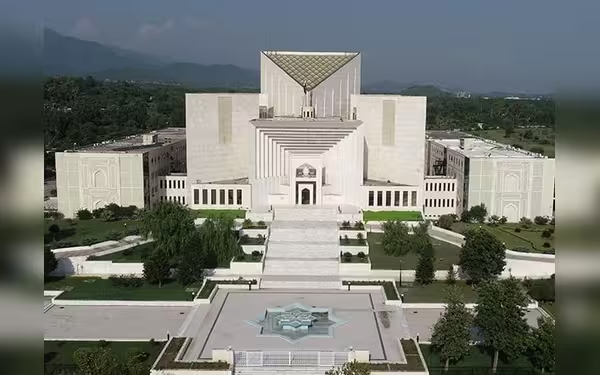Thursday, July 4, 2024 06:34 PM
Supreme Court Forms Bench to Address Reserved Seats Dispute
- Full-court bench led by Chief Justice Qazi Faez Isa established
- Legal battle over allocation of reserved seats intensifies in Pakistan
- Significance of accurate representation in Parliament highlighted through ongoing case
 Image Credits: thefrontierpost
Image Credits: thefrontierpostA full-court bench of the Supreme Court in Pakistan addresses the dispute over reserved seats, emphasizing the importance of accurate representation in Parliament and adherence to legal requirements.
A significant development has taken place in the legal realm as a full-court bench comprising 13 members of the Supreme Court has been formed to deliberate on the case concerning reserved seats of the Sunni Ittehad Council (SIC) on June 3. Chief Justice Qazi Faez Isa will be leading the bench, with Justice Musarrat Hilali's absence due to illness.
The Supreme Court's decision to suspend the verdicts of the Election Commission of Pakistan (ECP) and Peshawar High Court (PHC) regarding the allocation of reserved seats to political parties underscores the critical need to accurately reflect the people's mandate in Parliament, particularly concerning the allocation of additional seats.
Previously, the Peshawar High Court had dismissed SIC's petitions over reserved seats, and the ECP had rejected SIC's claim for reserved seats following a 'merger' with Pakistan Tehreek-e-Insaf (PTI). The ECP's ruling emphasized that SIC did not meet the legal requirements for claiming reserved seats, leading to the redistribution of these seats among other political parties based on proportional representation.
This year's electoral landscape differs from previous elections due to a notable presence of independent lawmakers who are ineligible for reserved seats. The Constitution mandates the allocation of reserved seats to political parties based on the number of lawmakers elected on general seats, with the ECP receiving candidate priority lists from parties before the elections to streamline the allocation process.
With 346 reserved seats for women and 10 reserved seats for minorities in the lower house, along with additional reserved seats for minorities in provincial assemblies, the distribution of reserved seats aims to promote fair representation and diversity within the legislative bodies.
The establishment of the full-court bench by the Supreme Court to address the reserved seats case reflects a crucial step in upholding the principles of democracy and ensuring equitable representation in Pakistan's political landscape. The ongoing legal proceedings underscore the significance of adhering to legal requirements and maintaining transparency in the allocation of reserved seats, ultimately contributing to a more inclusive and representative parliamentary system.













